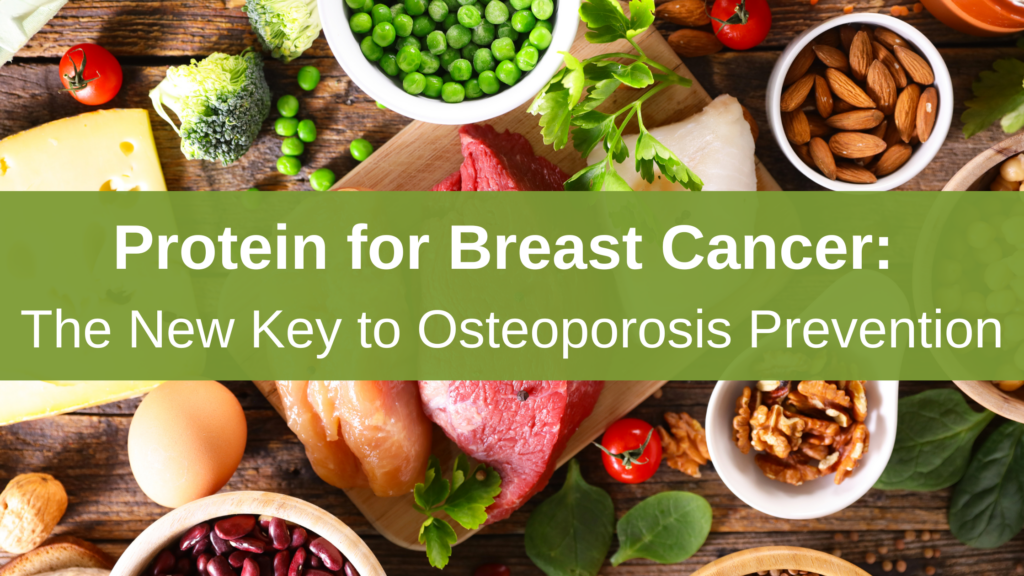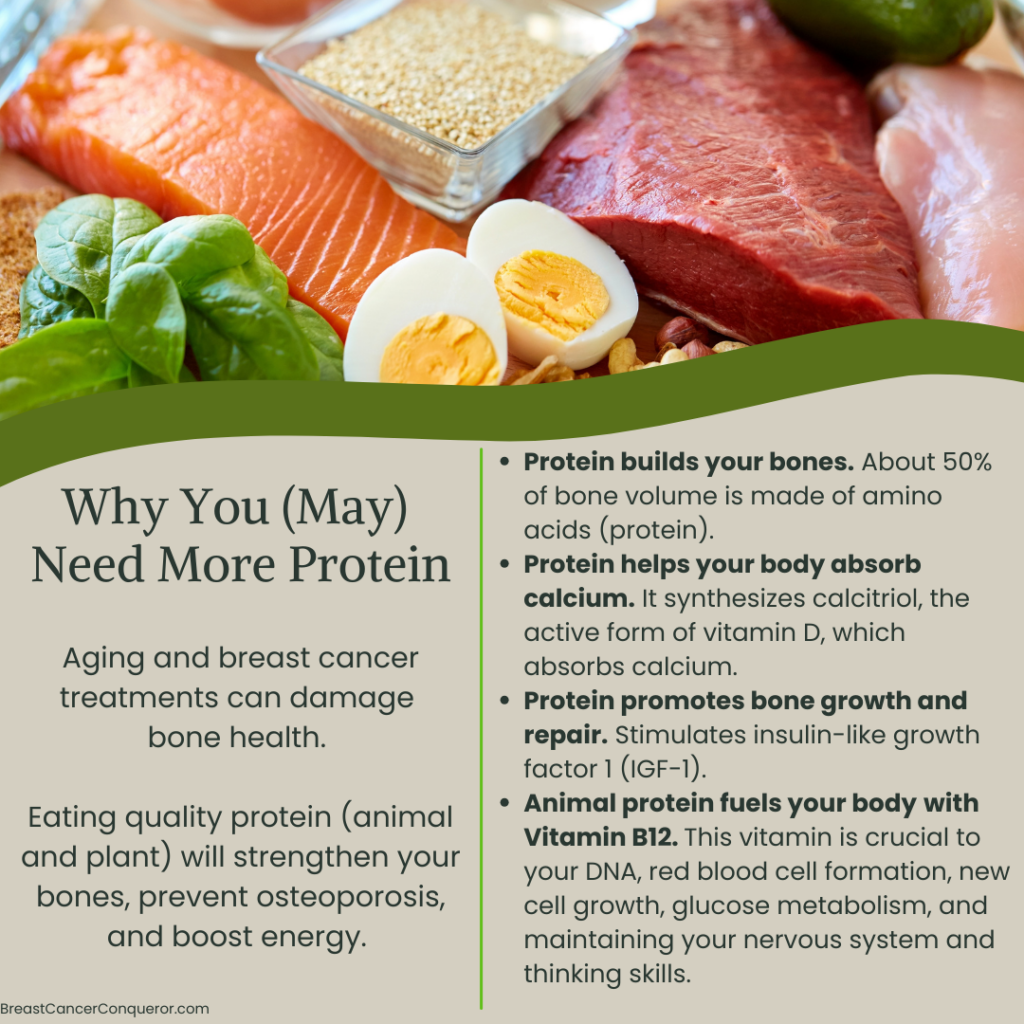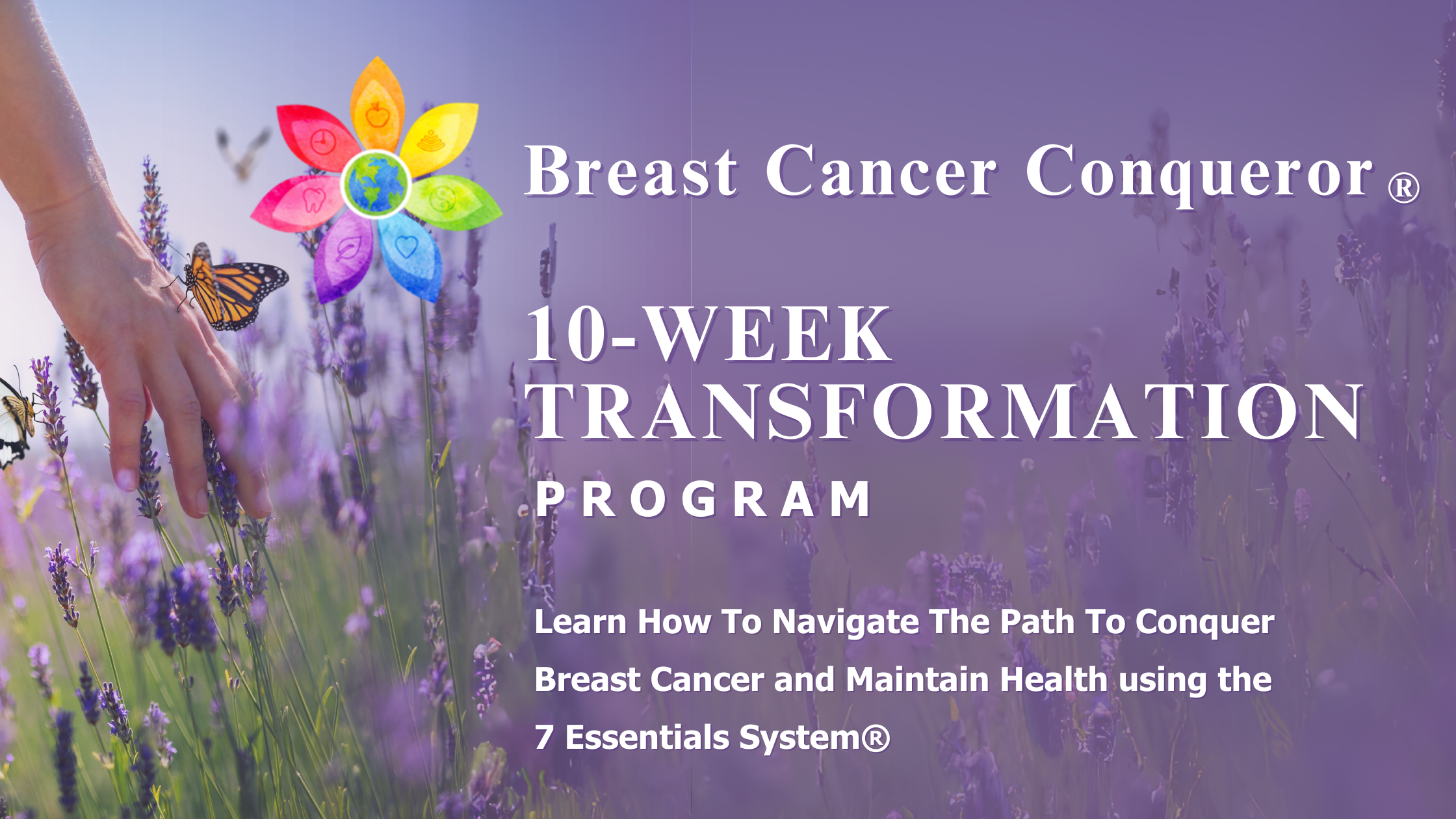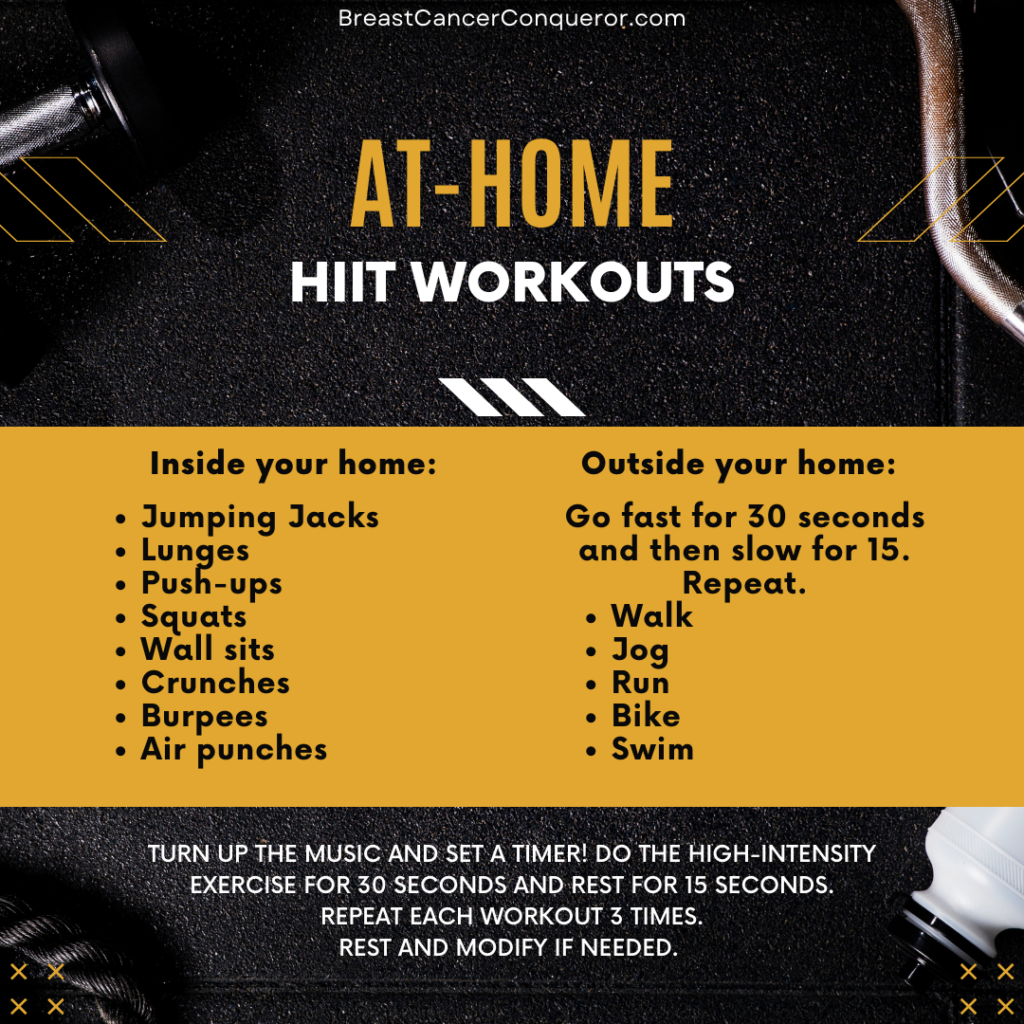
Quick Read:
- Aging, menopause, and specific therapies like aromatase inhibitors (learn more here) can accelerate bone loss and increase the risk of osteoporosis.
- Animal protein fuels your body with Vitamin B12. This vitamin is crucial to your DNA, red blood cell formation, new cell growth, glucose metabolism, and maintaining your nervous system and thinking skills.
- Flax, chia, and apricot seeds are filled with protein and have numerous breast cancer healing benefits.
It’s no secret that osteoporosis becomes a real concern for women as we age, especially after menopause. I’m sure it has come up in talks with your girlfriends this past month. But did you know that protein might be one of your greatest allies in protecting your bones?
Previously, it was thought that people should restrict their protein intake for cancer prevention, but the research and science have proven otherwise. A high protein diet (organic, healthy protein) isn’t just for gym-buffs; it might also be for breast cancer thrivers.
This is why we are bold and blunt in saying: A 100% plant-based diet may NOT be best for you.
It’s true, which is why we dedicated this blog to the protein-bone connection, how it affects women healing from breast cancer, and what you can do to strengthen and protect your bones.
Why Breast Cancer Thrivers Need to Think About Bone Health
Here’s the deal: breast cancer treatment can impact your bones more than you may realize. For example, specific therapies like aromatase inhibitors (learn more here) can accelerate bone loss and increase the risk of osteoporosis. Add to that the natural decline in estrogen during menopause (or treatment-induced menopause), and you’ve got a perfect storm for brittle bones and osteoporosis.
But you are meant to live a big, powerful life with strong bones holding you up!
And that’s where protein comes in.

Protein: A Powerful Ally for Bone (and Breast) Health
Starting around age 50, most women may need to increase protein intake to prevent the loss of skeletal muscle mass and strength. If not, the risk of developing osteoporosis, osteopenia, or the lesser-known sarcopenia (loss of skeletal muscle mass and strength) could increase. It can lead to an increased risk of falling, muscle weakness, fatigue, slow walking speeds, and overall difficulty in everyday life. All of which is the complete opposite of the vibrantly healthy life you are destined to enjoy!
Let’s break down why you need extra protein in your diet to prevent osteoporosis and heal breast cancer:
- About 50% of bone volume is made of amino acids, the building blocks of protein.
- Helps synthesize calcitriol, the active form of vitamin D (essential for calcium absorption).
- Stimulates insulin-like growth factor 1 (IGF-1), which promotes bone growth and repair.
- Animal protein fuels your body with Vitamin B12. This vitamin is crucial to your DNA, red blood cell formation, new cell growth, glucose metabolism, and maintaining your nervous system and thinking skills.
- Helps build lean muscle, which supports bone strength and stability.
- Makes you feel like your strong, brave, and powerful self!
Now here’s the connection to breast cancer: muscle mass is associated with better outcomes. Research shows that women with higher muscle mass during and after treatment may have lower recurrence rates and better overall survival. To learn more, please continue reading and review this study and this one.
Therefore, since aging and muscle loss can naturally go together, you must be extra intentional about fighting back with strategic exercises (learn about exercise oncology) and quality protein.
For a deeper dive into the science of why some women need animal protein, please review this blog post.
Prevent Osteoporosis With These Types of Protein
I hear this question running through your mind right now: But what about hormones, antibiotics, and toxins in all of those!? Great question, and a super valid one!
Our answer: Eat nutritious and nontoxic types of animal protein. Focus on buying from brands that offer:
- Pasture-raised and organic eggs and chicken
- Grass-fed (grass-finished is even better!) and organic meat
- Wild-caught fish such as sardines and salmon
A cheat sheet for buying animal products at the store
- 100% Grass-fed and free-range: Animals are allowed to roam around as they munch on fresh grass, as nature intended. Grass-fed does mean they are fed grass, but could have also eaten supplementary grains, which is something you want to avoid. However, unless the package also says organic, there are no guarantees that fertilizers or harmful pesticides weren’t used on the ground these cows were grazing on. Additionally, there is also no guarantee that they were not given any kind of hormones or anything else to change their growth.
- Grass-finished: The animals exclusively lived on their mother’s milk and forage, providing a much leaner and richer option in fatty nutrients.
- No antibiotics and no hormones: While this is super important because you don’t want mystery antibiotics and hormones in your body, there is no testing for the labels to ensure validity, and many are not third-party verified. This is why buying certain organic products is essential.
- Fish: Buy fish that have the lowest amount of mercury, such as mahi-mahi, cod, herring, sardines, trout, Pacific or Alaskan-caught salmon, etc. Usually, the smaller the fish, the better.
ButcherBox
Dr. V orders her meat and fish from ButcherBox.com because they source everything from partners with the highest standards of quality. Everything is guaranteed to be pasture-raised, free-range, organic, humanely raised, wild-caught, and all the good things you want for your protein! Click here to uncover the special deal they are offering to Breast Cancer Conquerors!
Recommended sources of plant protein
Of course, you should still include clean, nontoxic forms of plant-based protein in your diet. Here are a few options we love:
- Flax seeds (Click here to learn why they are also powerful breast cancer healers)
- Chia seeds
- Nuts (Click here to learn which ones are the best for healing breast cancer)
- Apricot seeds (Click here to learn why they also provide powerful anti-tumor effects and enhance the success of chemotherapy.
- Edamame (Click here for our delicious Anti-Cancer Edamame Salad)
- Broccoli, peas, and spinach (Yep, many vegetables are protein-filled!)
- Picked tofu and tempeh (Click here to learn about the types of soy you should eat)
More Ways To Support Bone Health
In addition to optimizing protein intake, here are some bone-loving, breast cancer-conscious tips to protect your skeletal health:
- Prioritize Muscle-Building Movement: Yoga, resistance bands, lifting, HIIT workouts, Pilates, bodyweight exercises—any activity that challenges your muscles will also support your bones. Click here for movement ideas and to learn more about exercise oncology.
- Get Sun and Supplement Strategically: Vitamin D + K2 are crucial for bone strength and immune support. One Thriver shared after increasing her vitamin D intake: “My new scan shows that I am no longer in the osteoporosis category, but now I am in the low osteopenia category.” Click here to discover just how crucial vitamin D is to your bone health and healing journey.
- Prevent Osteoporosis with (the right types of) Salt and Sodium: Your body desperately needs salt and sodium, so much so that it would rather break down bone to maintain sodium levels in your blood. AKA: Your body would rather have osteoporosis than low blood sodium! Click here to review this fascinating study on why salt is essential for building strong bones in women and why sugar causes osteoporosis. To shake out all the details about salt and sodium, please read this blog post.
Bonus Tip: Protein timing matters
 If you’re healing from breast cancer and supporting your bones, don’t save all your protein for dinner. Your body can only absorb so much at a time. Aim to distribute protein evenly throughout the day, and consider a protein-rich snack before or after exercise to boost muscle repair.
If you’re healing from breast cancer and supporting your bones, don’t save all your protein for dinner. Your body can only absorb so much at a time. Aim to distribute protein evenly throughout the day, and consider a protein-rich snack before or after exercise to boost muscle repair.
You Deserve Strong Bones and a Strong Future
You are not fragile—you are resilient.
Osteoporosis may be common, especially among postmenopausal women and breast cancer survivors, but it’s not inevitable. With strategic nutrition, movement, and testing, you can protect your bones, support your healing, and be strong from the inside out!
To level up your strategic nutrition and healing plans, join us for our next 10-Week Transformation Program starting soon! Learn how you can best navigate your path to conquer breast cancer and maintain your health.

